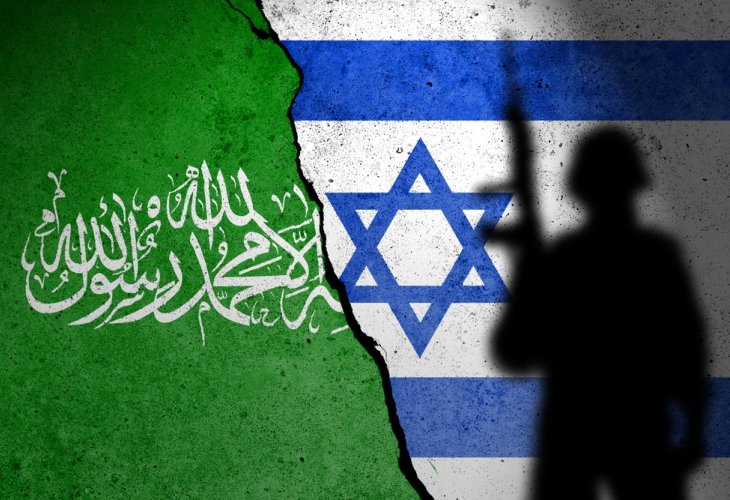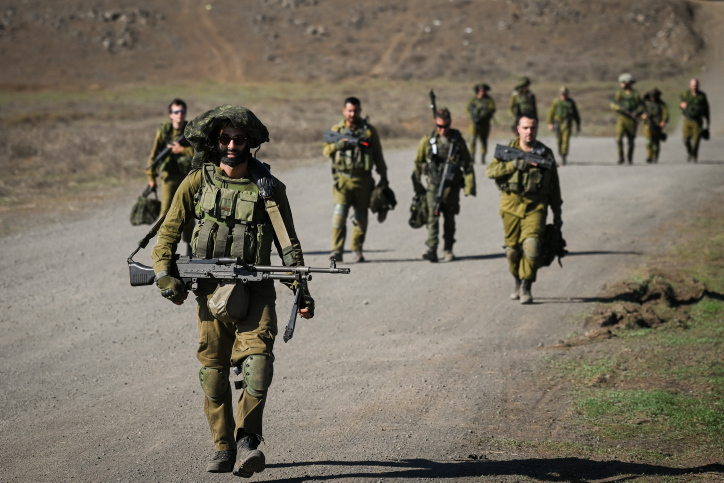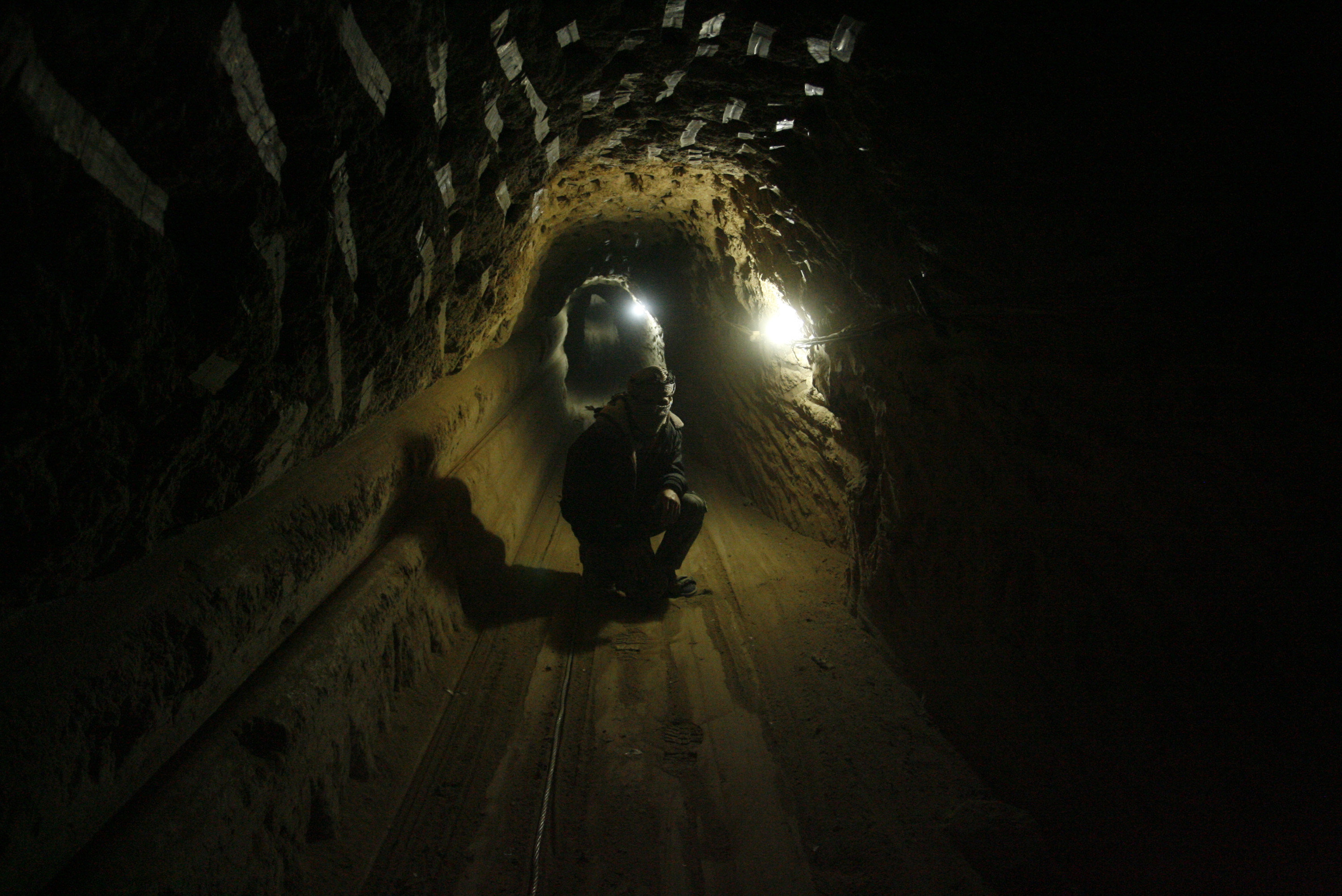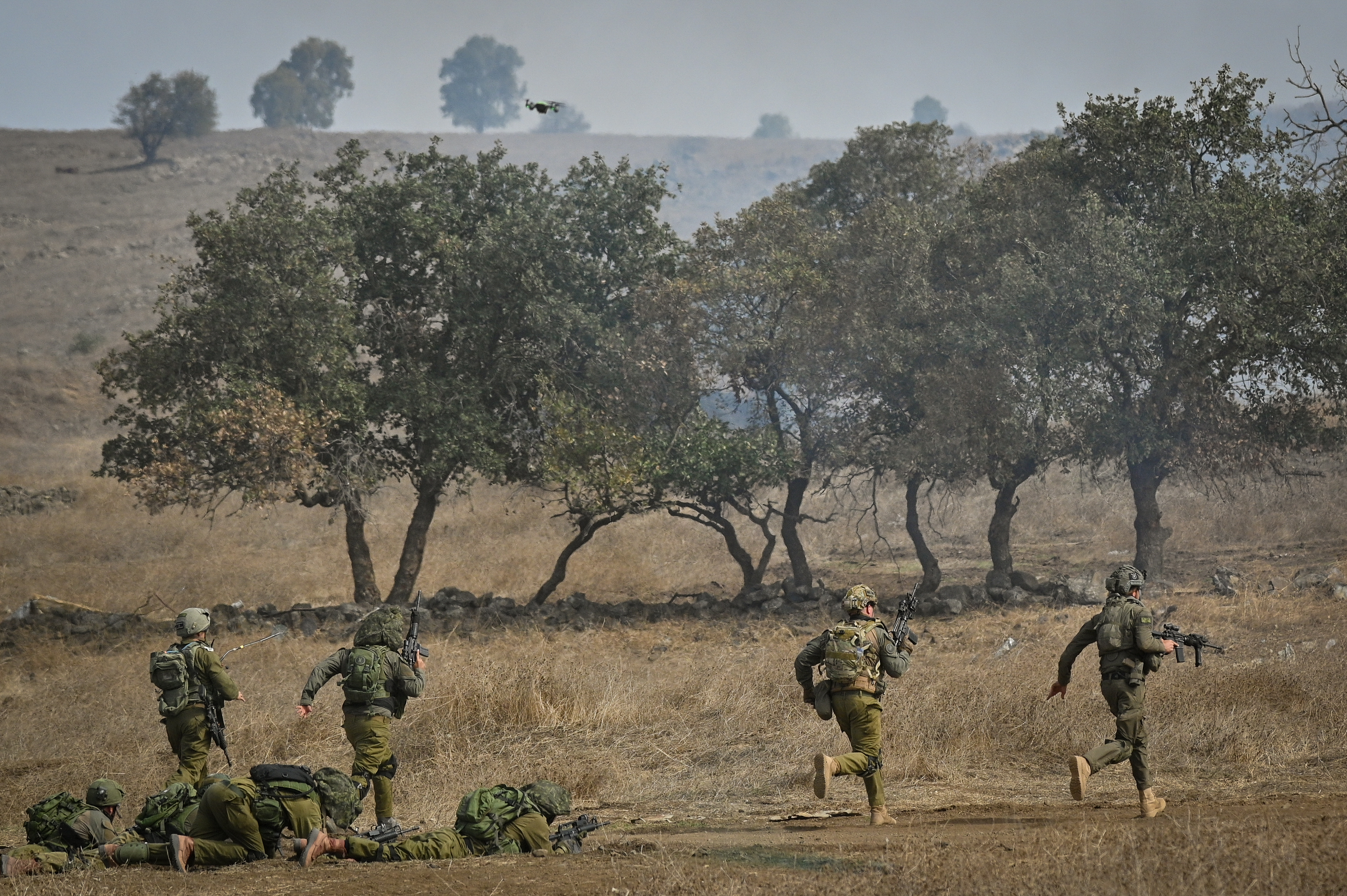"Hamas Misjudged the Israeli Response": Security Officials on the Massacre in the South and the 'Iron Swords' War
The shock of Hamas's attack on the south has been replaced by a significant Israeli response, including airstrikes and a ground incursion into Gaza since the weekend. Former senior security officials analyze the expected operation and its challenges.
 (Photo: shutterstock)
(Photo: shutterstock)Hundreds of terrorists who stormed the border communities on the morning of Simchat Torah surprised Israel, leaving security forces without a response for many hours. The shock of the first day has long since given way to active efforts against the Gaza-based terror organization.
Right after the announcement of the second phase of the 'Iron Swords' war, with the gradual ground incursion into the strip, we reached out to former top security officials who outline the expected battle between Israel and the murderous terror organization.
Major General (Res.) Yaakov Amidror served for decades in various roles in the IDF. He later served as the head of the Intelligence Research Division and as the head of the National Security Council. In a conversation with 'Hidabroot,' he admits that Israel was severely surprised on Simchat Torah. Discussing the current situation in the strip, he states: "This is not the planned ground invasion, but a gradual preparatory raid. When a real ground invasion occurs, there will be no doubts about it; the scale of forces, range, and more – will be entirely different."
Is there a way to defeat Hamas solely from the air?
"There is no way to combat Hamas terrorists solely from the air. Much can be done from the air, but to defeat this terror organization – which we have no choice but to defeat – we must go ground into the strip."
Could the battle expand to Judea and Samaria?
"We are doing everything to prevent this. That is why we conduct nightly arrests in all the explosive regions of Judea and Samaria. Since the operation began, the IDF has arrested over a thousand people and killed over a hundred terrorists in Judea and Samaria, including an Air Force plane operating on a mosque in Jenin after the Shin Bet discovered a terrorist cell hiding in a tunnel beneath it. Thus, the activity is indeed at high intensity, and we hope it will truly succeed."
Ultimately, what is Israel’s goal in this war?
"Our goal is to eliminate Hamas's military capabilities, reach the headquarters, kill them, and destroy everything built above and below ground. We will need to do this by capturing the strip and then remaining inside for several months, during which we must seize all physical infrastructure, kill the terrorists. We must carefully evaluate the next phase once we succeed in capturing the strip. Only then can we know exactly where we are headed because it is important to understand–as long as the strip isn’t captured, it is challenging to know what we can do next."
"Soldiers Should Not Enter the Tunnels in the Strip"
Major General (Res.) Gershon Hacohen also served in numerous high-ranking roles in the IDF. Among others, he served as the commander of the Northern Corps and was a leader in the 'Defensive Shield' Operation that neutralized terrorist strength in Judea and Samaria. Regarding the current campaign managed by Israel, he states: "The airstrikes we have focused on so far are critical. Every air raid targets thoroughly checked objectives, most of which are military offices, command rooms, both below and above ground. We've also hit weapons depots, tunnels, rocket stockpiles, and rocket launch positions, although, unfortunately, they still have positions from which they target Israel."
Alongside the military objectives of the strikes, the airstrikes have a civilian purpose, as Hacohen explains: "We've hit Hamas military commanders and their homes. Many Hamas leaders in the strip now have no standing homes. Additionally, the bombings bring ruin to the strip."
 (Photo: Michael Giladi / Flash90)
(Photo: Michael Giladi / Flash90)Is there a goal to bring ruin to the strip?
"Absolutely," he responds. "As the heavy bombings on Berlin and Dresden (cities in Germany) during World War II contributed significantly to Nazi surrender, so now. Although the ruin in the strip concerns the terror organization Hamas less, it significantly troubles the strip's residents. It's important to remember that ultimately, Hamas draws its power from the Gaza population's support of terror, which is now taking a heavy blow. Also, it's important to understand," he adds, "that this is not a military struggle but a religious confrontation. For now, they believe the time of their redemption has come. Our goal is to show them how wrong they are, and that this moment is actually the time of their ruin."
What about dealing with the underground tunnels?
"On this matter, it's essential to explain that every Air Force attack requires advanced planning, suitable bombardment, appropriate ammunition, and precise accuracy," he states. "Regarding tunnel attacks – it depends on exactly that, the question of how deep these bombings can go. Already, it can be said that some tunnels can be destroyed, but not all, as some are located at significant depths, even dozens of meters."
 (Photo: Abed Rahim Khatib / Flash90)
(Photo: Abed Rahim Khatib / Flash90)"Regarding the recent discussions about possibly attacking the tunnels on the ground, I strongly hope IDF soldiers will not enter them. In my opinion, it is practically impossible to fight in this undercover city that Hamas has established beneath the strip's soil. There are various methods to deal with the tunnels. It's crucial that the terrorists hiding within meet their end through the destruction or damage to the tunnels of the organizations in Gaza."
You held a senior position in 'Defensive Shield' Operation, how different is the battle in the strip likely to be from the one you led in Jenin?
"Undoubtedly, these are two entirely different operations. The enemy we faced in Jenin was much weaker and less equipped. The gap between the cases is enormous. Even the skill of the terrorists there and the skill of Hamas terrorists – is vastly different, to Hamas's advantage today."
"Weeks of Strikes Without Error"
Brigadier General Yossi Kuperwasser, former head of the Military Intelligence Research Division, a member of the 'Bithonistim' movement and the Jerusalem Center for Public Affairs and State Affairs, explains that the IDF's activities operate in phased methods for now. "The IDF attacks from the air, followed by a series of raids increasing gradually in intensity. We have now passed a phase and remain in the area, still working on improving battle conditions. However, I do not think what we see now is the start of the official ground incursion. When will the IDF significantly enter the strip? It is difficult to assess now. Although it depends on the resistance intensity. It also depends on how cautious we wish to be upon entering."
What grade do you give the military campaign Israel is conducting so far?
"So far, significant achievements: Gaza is under an unprecedented attack scope; many points have been attacked, above and below ground; we have also significantly hurt Hamas's civilian and military infrastructure. Until now, I have not heard of even one mistake in target selection by Israel. It's crucial to understand there were thousands of targets attacked, which accounts for a significant achievement."
"Regarding its effect on Hamas," he continues, "there is no doubt that a non-stop air attack for three weeks has a substantial impact on its system. We must also remember there are many senior figures hit. We would like more, of course, but even this is particularly significant."
How should Israel act now against Hamas?
"Overthrow Hamas," he is adamant. "We have no other choice, for whenever we had another option, we preferred not to enter there and overthrow this organization. I, myself, have argued for this long ago. I've stated that I think so because we cannot live in such a situation, where we present the Israeli population as ducks in a shooting range against Hamas, while this terror organization knows it will not pay a significant price for its actions other than limited intensity airstrikes."
What about the hiding of Hamas senior members in Shifa Hospital, should Israel destroy the place?
"Overall, it seems the recent raising of this issue (of what’s happening under the hospital – D.F.) on the agenda was meant to provide something to Israel. After all, it is not a novelty that Hamas's terror activities occur under this hospital, so raising the issue might symbolize the start of Israeli action in this direction. As is known, the saying goes: A gun that appears in the first act will fire in the third act."
And what about the situation in the north?
"There might be a possibility that Hezbollah decides to actively intervene in the fight. Therefore, we must be well-prepared for any development and, of course, enter and strike the organization.
"However, if we conclude this event with the north not igniting, the situation will be excellent for Israel. In my view, unlike in the strip, we might be able to leave the north for now with Hezbollah. But this will happen after we destroy Hamas and teach the northern, much more dangerous enemy, the lesson: what kind of Israeli response follows a brutal act against it."
 (Photo: Michael Giladi / Flash90)
(Photo: Michael Giladi / Flash90)Isn't it dangerous to leave such a power in the north after what we have seen terrorists can do?
"Our situation in the north differs from what exists in the south. Against Hamas, we are dealing with Palestinians wanting to deprive us of our very existence and the land we sit upon. Although Hezbollah, too, would like us to leave for an all-good world, it is a Lebanese entity more than a Jihadist or Iranian force - and Lebanon does not consider Tel Aviv part of it."
The Surprise of Hamas
One of the critical questions after Hamas's murderous attack on Israel and Israel's ensuing response—is whether the terror organization was surprised by the Israeli reply, or whether it took this into account and preferred to slaughter Jews despite understanding that Israel would wage fierce war against them? The security experts we spoke with share a similar position, albeit with slight differences.
Kuperwasser: "I believe Hamas was very surprised by the Israeli response, and views its actions during Simchat Torah as a strategic error. Hamas underestimated several aspects: Firstly, it thought that Israel was weak, especially against the backdrop of the political struggles preceding the massacre. It believed that it could embarrass Israel, harm it – primarily bringing about the release of hundreds and thousands of Hamas terrorists, and possibly lifting the siege from Gaza.
"Another error by Hamas concerned the Americans. The organization believed the U.S. was weaker in its response to various events in light of its mild response to attacks on its forces in the Middle East before the massacre. Additionally, Hamas was confident that the relationship between Israel and the U.S. was not what it was because of the tense relations between Biden and Netanyahu, so the organization did not accurately estimate the U.S. rallying alongside Israel at this difficult time after the massacre.
"A third mistake by the terror organization was in estimating the Israeli response. Hamas believed that Israel would just repeat the same actions: attack from the air, eliminate some commanders, not the most senior ones, but ultimately yield to its demands and revert to previous policies. Hamas anticipated paying with a few thousand dead, or even fewer, but that would be the extent of it.
"What changed is that Israel suddenly discovered unity across the board regarding the desired response to Hamas: refusal calls disappeared immediately, and there is now a surplus of recruits; the relationship with the U.S. is much deeper than the organization thought; and the worst for Hamas, this is the Israeli decision that what was shall be no more, as Israel has decided to eliminate the entire power of the Gaza terror organization. This reaction also made the issue of prisoners almost marginal in the main story, as the leaders of the terror organization now need to use hostages primarily to protect themselves and the entire future of Hamas."
Hacohen: "Hamas is a murderous terror organization for which murder is ingrained and precedes any military strategy. Therefore, I believe it saw the current situation as a plausible option before attacking Israel. It is important to understand that the situation is quite familiar to Hamas for now. The IDF acts as the organization assumed it would: attacking mainly from the air, which they have experienced and are drilled in. Now, with the start of the ground entry, it is certain it will defeat us in the long tunnels it has established beneath the strip. If the IDF succeeds in dismantling and destroying Hamas, there is no doubt Hamas was not prepared for this."
How long do you estimate the war will last?
Kuperwasser: "It is impossible to know. In the past, when I served as the commander of the Central Command, I said the Intifada would last six years. No one believed me then, but it eventually proved I was right. Here the picture is much more complex, of course. Additionally, it is likely that everything will change in battle; it is possible that Sinwar will realize the war is lost anyway and conclude that it is better to surrender under certain conditions. Maybe."
Amidror: "The ground maneuver is expected to take several weeks, in my opinion. But after that will come the phase of cleansing the strip of terrorists and terror infrastructure, a phase expected to last several additional months. When I speak of 'cleansing,' I mean an actual war against Hamas terrorists who will still remain on the ground in significant numbers."

